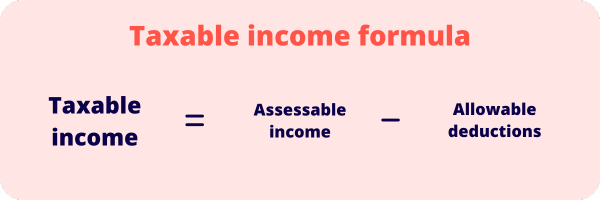Whether you’re running a business, working as a paid employee or earning money through various other means like being a sole trader, as an Australian taxpayer, you need to learn what constitutes income. So strap in, because our complete guide will break down exactly what defines ‘income’ while also highlighting a few important aspects like gross income, net income, taxable income, and how they can affect your tax return.
Income definition
Income is essentially all money or monetary value earned through employment, investments, business activities, and a number of other sources, either regularly or every so often.
This includes things like wages and payroll, salary, business earnings, dividends from investments, interest from savings and more. The amount of income you receive will also impact how much tax you’ll pay at the end of the financial year, as well as your eligibility for government payments and your overall financial planning.
Types of income in Australia
Gross income
This is the total income received before any deductions or expenses are considered. It includes everything paid by an employer or generated from a business, investments or other income streams. Let’s say your employer pays you a salary of $80,000 per year – this is your gross income.
Net income
Net income is the amount left after accounting for expenses, taxes, and other deductions from your gross income. Think of it as essentially being the money you take home. For example, if you earn $80,000 gross income annually and pay tax, contributions to superannuation and other allowable deductions of around $20,000, then your net income would be $60,000.
Taxable income

This is the portion of your gross income that’s used to calculate how much tax you owe to the government. It involves subtracting allowable deductions from your assessable income. In simpler terms:
Taxable income = Assessable income − Allowable deductions
Allowable deductions reduce your taxable income, thereby lowering how much tax you’re obligated to pay. Examples include work-related expenses, investment costs, charitable contributions, etc.
Assessable and exempt income
In Australian tax law, income received falls into several different columns:
Assessable income
Most of the income taxpayers earn is assessable income, meaning you need to report it on your tax return and, in most cases, pay tax on it. Assessable income includes things like:
- Salary and wages from your job.
- Bonuses, commissions and overtime paid by your employer.
- Interest from bank accounts and other investments.
- Dividends from shares.
- Business profits.
- Rental income from property you own.
- Payments for services rendered.
Exempt income
Exempt income is the income you don’t pay tax on. Even though you don’t pay tax, you will still need to report any exempt income on your tax return, as it could have an effect on how other payments or entitlements are calculated. Examples for exempt income include:
- Some government pensions, like the Disability Support Pension.
- In some cases, education allowances and scholarships.
If exempt income is your only income during a tax year, you won’t have to pay any income tax on it.
Non-assessable, non-exempt income
As the name suggests, non-assessable, non-exempt income is the money you don’t include in your tax return and can’t claim deductions on. A few examples of this type of income include:
- Superannuation co-contributions from the government.
- Some disaster-relief payments and grants.
- Any gifts or inheritance received.
Income from business activities
If you are one of the many small business owners in Australia, your income can come from various sources, including cash, digital payments, vouchers, goods or services. You’ll need to stay on top of this and report your business income correctly when it comes time to lodge your tax return. Some of the most common business income sources include things like:
- Sales revenue from products and/or services.
- Online and overseas business activities.
- Payouts from insurance claims.
- Income earned from personal services you provide (e.g. consulting).
- Earnings from work in the sharing economy (e.g. ride-sharing)
Remember: tax law means you have to keep accurate financial records for at least five years.
Special considerations: Investment income
Income from investments, such as dividends, interest, and rental-property earnings, must be included in your total income. Dividends received from company shares, for example, or interest earned on savings accounts are both types of assessable income and therefore must be declared at tax time.
Reporting and paying tax
Every Australian taxpayer has to report their income earned every year by lodging a tax return with the Australian Taxation Office (ATO). The tax you pay will depend on your total taxable income and comes down to progressive tax rates. All that means is that higher incomes are hit with higher tax rates than those on lower incomes.
Deductions
Allowable deductions will see your taxable income get lower, and reduce the amount of tax you have to pay. Think about things like:
- Work-related expenses (e.g. uniforms or tools).
- Interest on loans for investment properties.
- Superannuation contributions.
- Professional fees for managing tax affairs (e.g. hiring a bookkeeper or tax agent).
Child support and other payments
Some payments, like child support, aren’t considered income for tax purposes. They are neither assessable nor reportable on your tax return. However, government pensions and some other payments might be taxable or exempt, depending on the type of payment. Always check with your accountant or tax professional.
Income increases and tax implications
As your income goes up, you’ll have to deal with the reality of paying more taxes because of our progressive tax system. Being careful with your tax planning and staying across all your available deductions and offsets will become increasingly important as your earnings grow.
Now that you know exactly what constitutes income, you can be much more effective at planning ahead and managing your financial and tax obligations for the future. Just remember to always consult with a tax professional or qualified accountant if you have specific questions or complex income scenarios – especially if tax time is fast approaching.
See related terms
What are expenses?
What is gross pay
What is net income?



















































